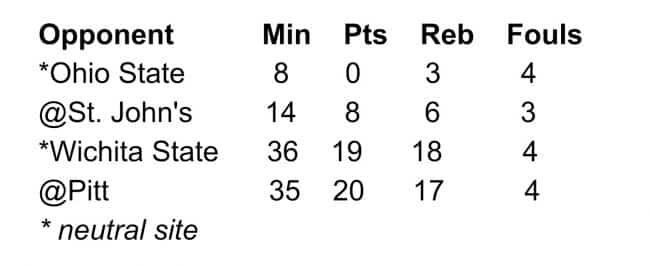
Heralded freshman Oscar Tshiebwe is West Virginia’s most talented player. He has been since the moment he stepped on the floor.
That’s not good enough.
That might sound unfair to a true freshman only slightly more than one-third of the way through his first season of college basketball. But it’s not an unreasonable expectation to believe that a five-star, McDonald’s All-American would be consistently dominant.
Consistency is the key word here. Tshiebwe has had games where he was the best player on the floor and it wasn’t particularly close. He’s also had games where he has been practically invisible.
That consistency hasn’t improved. At all.
What’s hampered Tshiebwe most has been an inability to stay out of foul trouble. Tshiebwe struggled with foul problems in his first game. He struggled with it in his last one. It’s a serious problem that isn’t getting any better.
No game highlighted the issue more than his most recent one.
In WVU’s 67-59 upset of No. 2 Ohio State on Sunday, Tshiebwe was a ghost. He didn’t score and had just three rebounds. The reason behind the ugly stat line was Tshiebwe getting called for four fouls in just eight minutes of play. That’s completely unacceptable for a player who sees himself – and his team sees him – as a star.
Against Ohio State, Tshiebwe picked up two fouls within the first two minutes. That can’t happen. Tshiebwe has to adjust his play after getting that first foul, regardless of how the game is being officiated. He didn’t. When Tshiebwe quickly picked up a second foul, coach Bob Huggins had to put him on the bench.
Midway through the first half, Huggins showed massive faith in his freshman when he reinserted Tshiebwe into the game with those two fouls. Tshiebwe proved Huggins trust was severely misplaced by quickly picking up his third foul of the half.
Down 37-31, Huggins started the second half with Tshiebwe (three fouls) and sophomore forward Derek Culver (two fouls) on the floor. Tshiebwe picked up his fourth foul within a minute, ending any realistic chance to help the team.
Culver eventually picked up his fourth foul, but not until the waning moments of the game. Culver’s ability to stay on the floor in the second half was vital to the victory. That’s the difference between a big man who knows how to dodge the foul-trouble raindrops and Tshiebwe.
If it was early in the season, an argument could be made that Tshiebwe’s foul trouble against Ohio State was a byproduct of the young big man being over-matched by the talented Buckeyes, the best team WVU has played thus far. But it’s not early and the numbers don’t show a correlation between good opponents and Tshiebwe foul issues limiting his production.
Check out the stat lines for Tshiebwe against the best four teams the Mountaineers have played so far:

Tshiebwe had foul problems in all four games, picking up four in three of the games. But all four-foul games aren’t the same. If, as Tshiebwe did against Pitt, he spreads the four foul calls across the length of the contest, he will spend most of the game on the floor. When that happens, his stat line shines.
However, when those foul calls come in short clusters, like against Ohio State, Tshiebwe is relegated to the bench and his contribution is negligible.
It’s going to get harder before it gets easier for Tshiebwe. He and the Mountaineers travel to Allen Fieldhouse to face Kansas on Saturday. A visiting freshman isn’t going to get any benefit of the doubt in Lawrence, Kan. The whistles will be quick and plentiful. Call it a conspiracy or call it life on the road in college basketball, it is what it is. If Tshiebwe is going to be a part of the solution to the problem that is beating Kansas in Kansas, he has to adjust to it.
Avoiding foul trouble is as important a skill for a big man in basketball as rebounding or blocking shots. It’s past time Tshiebwe learns it.






